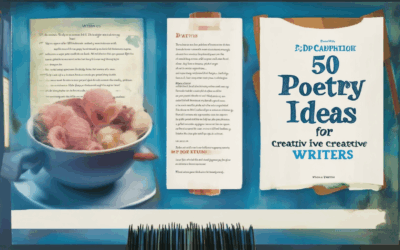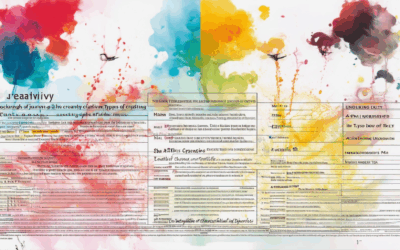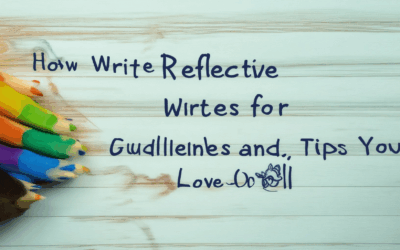Writing poetry can often feel like a daunting task, especially when inspiration seems elusive. Poets frequently seek creative sparks, whether through observation, reflection, or exploration of literature. This article delves into literary ideas for poets, offering a wealth of strategies and insights to unlock your creative potential. From discovering inspiration in everyday moments to experimenting with unique themes and structures, we’ll explore diverse approaches to fuel your poetic journey. Whether you’re looking for prompts to spark ideas or techniques to refine your craft, this guide provides a comprehensive roadmap to inspire and empower your writing.
Key Takeaways
– Discover creative inspiration with over 50 poetic ideas spanning diverse themes, from childhood memories to historical myths.
– Unlock your potential with practical tips for crafting compelling poem starters that hook readers from the very beginning.
– Embrace the freedom of non-rhyming poetry to express your unique voice and tell stories that resonate deeply.
– Explore everyday objects, seasonal changes, and sensory experiences to find fresh perspectives in your poetry.
– Dive into philosophical reflections and personal growth to add depth and meaning to your verses.

Where Do Poets Find Ideas for Poems?
Poets find inspiration in a variety of places, allowing their creativity to flourish through observation, reflection, and exploration. Here are some common sources of inspiration:
- Observation of the World : Poets often draw from the beauty, chaos, and wonder of the world around them. Whether it’s a sunrise, a bustling city street, or a quiet forest, everyday sights and sounds can spark a poem.
- Personal Reflection : Many poets turn inward, reflecting on their emotions, memories, and life experiences. This introspection can lead to deeply personal and meaningful poetry.
- Reading Other Poets : Studying the works of established poets can provide insight into different styles, techniques, and perspectives. It’s a great way to learn and find inspiration.
- Music and Lyrics : Music often serves as a muse for poets. The rhythm and melody of a song can evoke emotions or imagery that translate well into poetry.
- Conversations and Overhearing : Eavesdropping on conversations or engaging in chats can provide snippets of dialogue or ideas that might become the foundation of a poem.
- Reviewing Past Work : Looking back at previous writings allows poets to revisit themes, motifs, and ideas they may have forgotten or revisited in a new light.
- Wordplay and Creativity : Poets often experiment with words, playing with syntax, metaphors, and similes to create unique expressions and imagery.
- Requests from Friends and Colleagues : Asking for prompts or ideas from others can provide a fresh perspective and help break creative blocks.
- Art and Photography : Visual art, whether in museums or online, can inspire poets by providing vivid imagery and emotional resonance.
- Writing Communities : Joining poetry workshops, groups, or online forums can expose poets to diverse ideas, feedback, and encouragement, fostering new creative directions.
By exploring these avenues, poets can continually discover new subjects and approaches, enriching their craft and contributing unique voices to the literary world.
What Are Some Poetry Prompts?
Poetry prompts are creative writing exercises designed to inspire and guide writers in crafting poems. They often encourage exploration of themes, emotions, and styles. Below are some types of poetry prompts that can spark your imagination:
- Style-Based Prompts
- Sonnet Prompt: Write a Shakespearean sonnet about love.
- Haiku Prompt: Capture a moment in nature with a traditional haiku.
- Free Verse Prompt: Write a poem without any rhyme or meter, focusing on personal feelings.
- Concrete Poem Prompt: Use everyday objects to create imagery and meaning.
- Subject-Based Prompts
- Seasonal Prompt: Write a poem about autumn leaves.
- Mythological Prompt: Retell a classic myth in modern language.
- Historical Prompt: Describe a significant historical event through poetry.
- Personal Prompt: Reflect on a meaningful memory or experience.
- Form and Structure Prompts
- Tanka Prompt: Write a tanka, a five-line poem with a fixed syllable structure.
- Quatrainnain: Craft a poem in the shape of a four-line stanza.
- Shuttle Song: Use a shoelace loop to tie together unrelated words into a poem.
- Couplet Prompt: Create couplets (two-line rhymes) exploring a theme.
- Thematic Prompts
- Emotion Prompt: Write a poem about fear or hope.
- Conflict Prompt: Explore conflict in a relationship or society.
- Transformation Prompt: Describe a character’s journey from one state to another.
- Mystery Prompt: Create a poem with unanswered questions or unsolved mysteries.
- Tools and Resources
- Silken Drum Poetry Prompts : Discover curated prompts and inspiration for all levels of writers.
- Writing Forums: Join communities like Silken Drum Forum to share ideas and receive feedback.
- POETRY BLOGS: Follow blogs like Silken Drum Blog for daily prompts and features.
- Tips for Creating Poetry Prompts
- Start with a specific theme or emotion you wish to explore.
- Research existing poems or literature on the topic for inspiration.
- Experiment with different poetic forms to broaden your skills.
- Read works by established poets to study their techniques.
By trying these poetry prompts, you can unlock new creative avenues and develop your unique voice as a poet. Whether you’re a beginner or an experienced writer, there’s always something fresh to discover in the world of poetry!

How Do Poets Get Ideas?
Poets often draw inspiration from a variety of sources to spark creativity and develop unique ideas. Here are some common methods they use:
- Observation : Poets observe the world around them, noticing patterns, colors, shapes, and emotions. This can lead to fresh perspectives and unexpected imagery.
- Imagination : Many poets rely on their imagination to craft vivid scenes and characters. Techniques like freewriting or mind mapping can unlock creative ideas.
- Reading : Exploring works by established poets can inspire new ideas. Reading diverse styles helps poets understand what resonates with audiences.
- Personal Experiences : Life events, emotions, and memories often serve as rich material for poetry. Reflecting on these experiences can yield deeply personal and relatable themes.
- Inspiration from Others : Poets are influenced by music, art, films, and conversations. These experiences can ignite emotions or concepts that translate well into verse.
Finding Inspiration
Poets also seek inspiration through communities and platforms like Silken Drum , where they can connect with fellow writers and explore reflective content. Engaging with such communities can open doors to new ideas and creative approaches.
Remember, persistence and curiosity are key to unlocking your poetic potential. Explore these avenues and let your creativity flow naturally. For more resources and tools to fuel your poetry journey, visit Silken Drum .

Top 10 Poem Topic Ideas
Writing a poem can be a deeply personal and rewarding experience. Here are some thoughtfully curated topics to inspire your creativity:
- Childhood Memories – Reflect on a specific moment or event from your youth that holds special significance. Whether it’s a family gathering, a first day at school, or a memorable trip, allow your words to transport the reader back in time.
- Nature’s Beauty – Capture the essence of the natural world around you. Consider the changing seasons, the tranquility of a forest, or the mesmerizing patterns of the ocean waves.
- Love and Relationships – Explore the complexities of love, whether it’s the fleeting moments of young romance or the enduring bonds of friendship. Consider expressing gratitude or reflecting on a lost connection.
- Philosophical Reflections – Delve into abstract concepts like existence, time, or the meaning of life. Use metaphors and symbols to convey deeper truths and questions.
- Everyday Objects – Give ordinary things a poetic twist. Whether it’s an old photograph, a chipped teacup, or a worn-out book, find beauty in the mundane and ordinary.
- Historical or Cultural Myths – Draw inspiration from myths, legends, or historical events. Approach these tales with reverence and accuracy to create something timeless.
- Seasonal Changes – Observe the transformations that occur throughout the year. Capture the uniqueness of spring’s renewal, autumn’s golden hues, or winter’s quiet beauty.
- Sensory Experiences – Focus on your five senses to paint vivid pictures. Describe the smell of rain, the taste of fresh earth, or the sound of distant thunder.
- Personal Growth – Document your journey through life’s challenges and triumphs. Celebrate progress, learn from mistakes, and embrace continuous self-improvement.
What is a Good Poem Starter?
A good poem starter is the opening line or lines of a poem that immediately engages the reader, sets the tone, and sparks curiosity. Effective poem starters often:
- Sensory Details: Invoke sight, sound, touch, taste, or smell to transport the reader. Examples include:
- “The scent of rain-soaked earth filled the air.”
- “Sunlight filtered through leaves, casting dappled patterns on the ground.”
- Emotional Hooks: Tap into universal emotions or personal feelings. Examples include:
- “Loss felt heavy in the room, weighing down my spirit.”
- “Hope whispered in the breeze, urging me to begin.”
- Unique Perspectives: Offer a fresh viewpoint or unexpected twist. Examples include:
- “The world stood still as I watched the stars align for the first time.”
- “Silence was the only sound loud enough to be heard.”
- Conflict or Curiosity: Create tension or pose a question. Examples include:
- “She walked into the storm, her umbrella trembling.”
- “Why did the clock stop at three? Questions lingered in the quiet room.”
To craft a compelling poem starter, consider the following tips:
- Be Specific: Use vivid imagery rather than vague descriptions.
- Start Strong: Begin with action, emotion, or an intriguing scenario.
- End with a Question or Mystery: Leave the reader wanting more.
For more inspiration, explore poetry prompts and ideas on Silken Drum. Let your words paint a picture that resonates long after the first line is read!

How to Write Poetry That Doesn’t Rhyme
Writing poetry without rhyme can feel liberating, allowing you to focus on the essence of your words rather than the constraints of meter and rhyme schemes. Here’s a step-by-step guide to crafting effective non-rhyming poetry:
- Understand Your Purpose : Determine the theme, emotion, or story you want to convey. Knowing your purpose will guide your choices in word selection and structure.
- Choose a Structure : Decide between free verse and blank verse. Free verse has no set structure, while blank verse maintains a consistent meter without rhyme.
- Experiment with Rhythm and Meter : Even without rhyme, paying attention to rhythm can enhance the musicality of your poem. Find your personal rhythm by listening to the sounds in your words.
- Break Free from Consonance : Don’t rely solely on consonance to create a beat. Allow your words to fall naturally, creating a unique flow that reflects your voice.
- Use Imagery and Language Creatively : Focus on vivid imagery and strong language to convey emotions and ideas. Avoid clichés and aim for originality.
- Read Aloud and Revise : Hearing your words can reveal areas that need refinement. Read your poem aloud to ensure it flows smoothly and conveys the intended meaning.
- Seek Feedback : Share your work with trusted peers or mentors who can offer constructive criticism and help you refine your approach.
Remember, non-rhyming poetry offers flexibility and allows you to express yourself in a truly personal way. Embrace the freedom to explore unique patterns and structures that resonate with your individual style.
Conclusion
Writing poetry without rhyme is a rewarding experience that encourages innovation and self-expression. By focusing on rhythm, imagery, and purpose, you can create meaningful works that stand apart from traditional rhyming poems. Experiment, refine, and enjoy the journey of discovering your unique voice in poetry.




0 Comments